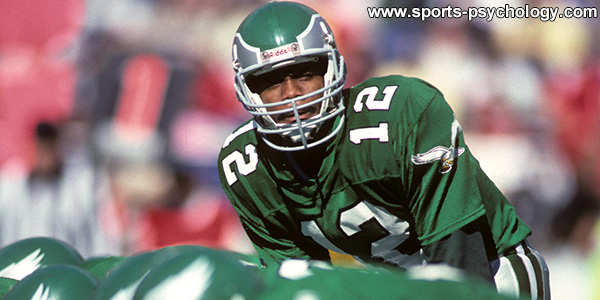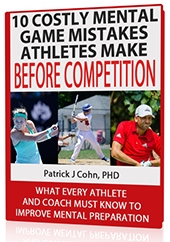
How Athletes Bounce Back From Defeat
Summary: Mistakes in sports do not define an athlete. Missed shots, dropped balls, or game-ending errors are part of competition, but they do not erase years of hard work, resilience, and achievement. Top athletes acknowledge their emotions, take responsibility, learn from the experience, and move forward.
A missed potential game-winning shot does NOT define you…
A fall during a major competition does NOT define you…
A dropped ball in a playoff game does NOT define you…
A false start at Nationals does NOT define you…
A game-ending mistake against your biggest rival does NOT define you. Missed opportunities can be bitter pills to swallow.
As heartbreaking as a mistake can be in a big competition, that one moment does not tell the truth about who you are as an athlete.
This is a Difficult Concept for Many Athletes to Buy Into
The sting of defeat is hard but some athletes agonize when they see themselves as the sole reason for a negative outcome.
It is understandable to experience negative emotions after a missed opportunity.
You put in a lot of work, dedicate a vast amount of time and make tremendous sacrifices as an athlete to put yourself in position to succeed.
Seeing it all slip away can be devastating for some athletes.
As Hard as it is to Accept, You Are More Than that One Moment
As an athlete, you are the sum total of everything you put into your sport…
You are a hard worker… You are resilient coming back from injury and overcoming mistakes… You are an achiever who has risen to many challenges and improved your game throughout the years.
In addition, you are more than just an athlete… You are a person with talents, skills, and positive qualities outside of sport.
It may be difficult to wade through the negative thoughts and emotions after missing out on an opportunity but you need to see the big picture if you are to learn from the experience and be motivated to bounce back mentally stronger in the future.
Take for instance Philadelphia Eagles wide receiver Alshon Jeffery…
Jeffery was a huge reason why the Eagles won the 2018 Super Bowl and also a major contributor to Philadelphia’s 2019 playoff run.
Unfortunately, Jeffery dropped a pass that halted the final drive with two minutes remaining in a divisional-round loss to the New Orleans Saints, ending the Eagles chances at repeating as champions.
Jeffery was upset in the locker room after the game but understands drops are also a part of the game.
JEFFERY: “It [stinks] right now. Everyone in the locker room, we’re all down. Like I said, I let my teammates down, I let the city of Philadelphia down. That’s on me. We’ll be back next year for sure. One play [doesn’t] define me… It happens. It’s part of football. I just hated the way it happened in the playoffs, and it was the final moment.”
Jeffery’s way of dealing with this one moment is an effective strategy to get passed this.
–>Feel The Feelings – The disappointment is undeniable and it is normal to experience those negative emotions.
–>Take Responsibility – The first step to move on is to take responsibility for your performance.
–>Credit Your Successes – If you are going to admit to mistakes, you must also credit yourself for your successes.
–>Move On – Let go. After some short amount of time, you will need to move forward. You can’t reach your potential as an athlete if you carry that negative baggage forever.
–>Learn – Identify what you can learn from the experience to improve your game in the future.
Don’t allow one moment define your role in sports… You are more than that!
Moving Past a Missed Opportunity in a Competition:
It is easy to dwell on one missed opportunity but it’s not healthy or beneficial to you as an athlete.
Move forward by listing all the things that helped you get to where you are… all the sweat, all the sacrifice, all the extra hours, all the successes, etc.
Defining yourself in broader terms will help you develop the mental toughness needed to succeed in the future.
And always remember that sports are what you do, not who you are!
6 Tips for Dealing With Mistakes
1. Don’t Let One Mistake Define You
Missed shots, dropped balls, or false starts do not define your ability as an athlete. Focus on the bigger picture of your overall performance and growth.
2. Acknowledge Your Emotions
It is normal to feel disappointment after a mistake. Allow yourself to experience these feelings without letting them take over your mindset.
3. Take Responsibility and Reflect
Admit your role in the outcome, but balance it by recognizing your successes. Reflection helps you understand what went wrong and how to improve.
4. Move Forward Quickly
Let go of negative moments and avoid dwelling on them. Mental toughness comes from refocusing on future opportunities rather than past mistakes.
5. Learn From Every Experience
Identify lessons from errors or missed opportunities. Use these insights to adjust your strategy and enhance your performance in future competitions.
6. Recognize Your Broader Value
You are more than one play or competition. Acknowledge your hard work, dedication, and achievements to maintain confidence and perspective as an athlete.
Related Sports Psychology Articles:
- How to Turn Mistakes Into Success
- How to Unlock Athletes’ Minds from Avoiding Mistakes
- Focusing on The Present Rather Than Past Mistakes
Free Mental Toughness Reports

Get instant access to a mental game report to improve your mental toughness. Are you making one or more of these “deadly” mental game mistakes prior to competition? You can improve your mental game with one of our free sports-specific reports below.
with our free mental toughness reports, you’ll:
- Discover if you have positive or negative pregame jitters.
- Identify your pre-competition mental game mistakes.
- Learn the important pregame mental skills to boost your performance and success!
Learn how mental game strategies can boost your mental toughness in sports with Dr. Cohn’s free mental game reports!
FAQ: Moving Past Missed Opportunities
Q: Does one mistake define me as an athlete?
A: No. Mistakes like missed shots or dropped balls do not define your skills or overall performance. Your career is the sum of your effort, dedication, and achievements.
Q: How should I handle disappointment after a mistake?
A: Allow yourself to feel the emotions, but do not dwell on them. Acknowledge the disappointment and then refocus on what you can control next.
Q: Why is taking responsibility important?
A: Owning your performance helps you learn from mistakes. Balance this by also recognizing your successes to maintain confidence.
Q: How can I move past a missed opportunity?
A: Let go of the negative moment, reflect briefly, and shift focus to future plays. Mental toughness grows when you avoid carrying mistakes forward.
Q: What can I learn from errors in competition?
A: Analyze what went wrong and identify ways to improve your technique, strategy, or preparation. Use each mistake as a learning opportunity.
Q: How do I maintain perspective as an athlete?
A: Remember that sports are what you do, not who you are. Value your hard work, dedication, and achievements beyond a single moment.
Dr. Patrick Cohn is an expert mental performance coach who has helped athletes for over 30 years enhance their performance. Dr. Cohn earned a master’s degree in sports psychology from CSUF and a Ph.D. from the University of Virginia, specializing in Applied Sports Psychology.
